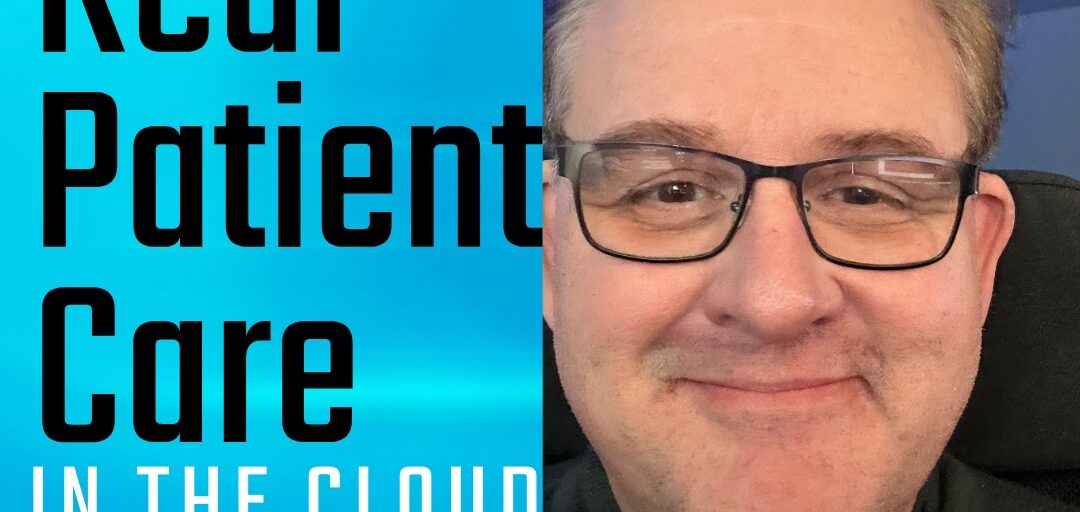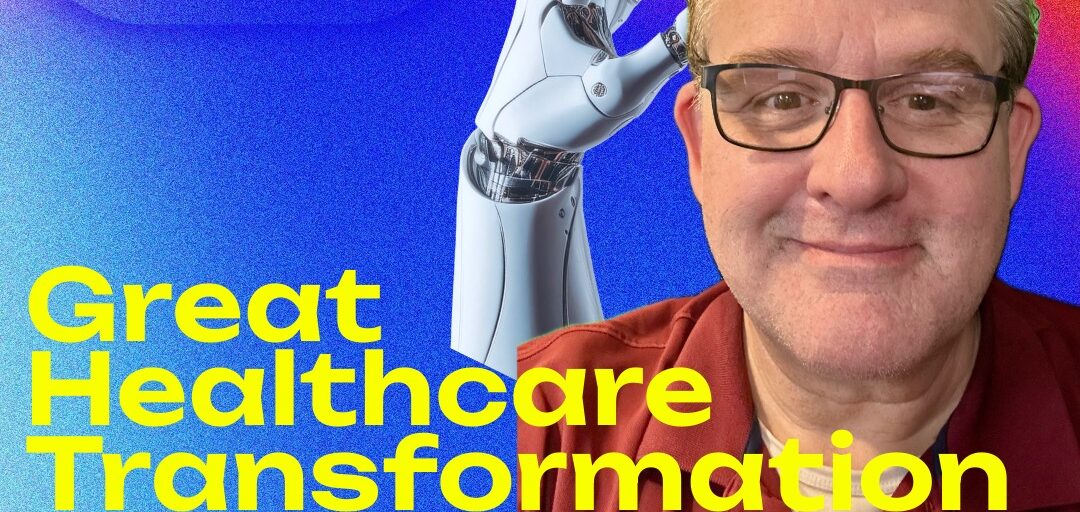From One Patient to One Million: How Healthcare AI Amplifies Clinical Impact
Written by Rod on July 21, 2025
Are you a clinical professional who entered healthcare to change lives but feels limited by only helping one patient at a time? What if healthcare AI clinical impact could amplify your expertise to improve care for thousands of patients simultaneously while giving you the meaningful work you’ve always craved? The most fulfilling careers in healthcare aren’t happening at the bedside anymore—they’re happening in digital health roles where clinical professionals use AI to scale their impact beyond anything traditional care delivery could offer.
The most fulfilling careers in healthcare aren’t happening at the bedside anymore—they’re happening in digital health roles where clinical professionals use AI to scale their impact beyond anything traditional care delivery could offer.
Your clinical expertise isn’t just valuable in AI healthcare—it’s the foundation for transforming patient care on a scale you never imagined possible.
The Impact Limitation of Traditional Clinical Care
Let’s be honest about the mathematics of bedside care. Even the most dedicated clinical professional can directly care for:
- 6-8 patients per shift in intensive care
- 12-15 patients per shift on medical floors
- 20-30 patients per day in outpatient settings
- Maybe 10,000 patients throughout an entire clinical career
These numbers represent individual lives improved—and that matters enormously. But what if your clinical expertise could reach 100,000 patients monthly through AI-powered systems that you help design and optimize?
The shift from direct patient care to AI-enabled healthcare isn’t about abandoning your mission—it’s about exponentially amplifying your impact on patient outcomes.
How AI Multiplies Clinical Impact
Artificial intelligence in healthcare works by taking the clinical decision-making patterns of expert clinicians and scaling them across entire patient populations. Your role isn’t to be replaced by AI—it’s to teach AI systems how to think like an experienced clinical professional.
Clinical Pattern Recognition at Scale
Your ability to recognize subtle changes in patient condition, identify early warning signs, and predict care needs becomes the foundation for AI systems that monitor thousands of patients simultaneously.
Traditional Impact: You notice a patient’s early signs of sepsis during your shift rounds.
AI-Amplified Impact: The pattern recognition you taught an AI system identifies sepsis risk in 500 patients across multiple hospitals, enabling early intervention that saves dozens of lives.
Evidence-Based Decision Support
Your clinical judgment, refined through years of patient care, guides AI systems that provide decision support to hundreds of other clinicians.
Traditional Impact: Your expertise helps your immediate patients receive optimal care.
AI-Amplified Impact: Your clinical insights, embedded in AI decision support tools, help thousands of clinicians make better care decisions for their patients.
Preventive Care Population Health
Your understanding of disease progression and risk factors enables AI systems that identify at-risk populations and trigger preventive interventions.
Traditional Impact: You educate patients about lifestyle changes during clinic visits.
AI-Amplified Impact: AI algorithms based on your clinical knowledge identify 10,000 at-risk patients and automatically trigger personalized prevention programs.
Real Stories: Clinical Professionals Scaling Their Impact
Sarah’s Story: From ICU Nurse to AI Clinical Consultant
Sarah spent 8 years as an ICU nurse, becoming expert at recognizing subtle signs of patient deterioration. Today, she works with an AI company that developed early warning systems for critical care.
“I helped train the AI to recognize the same patterns I used to catch at the bedside,” Sarah explains. “Now that system monitors patients in over 200 hospitals. Every day, it identifies patients who need immediate attention—patients who might have been missed without AI assistance.”
Her impact scaling: From helping dozens of critically ill patients per month to improving care for thousands of ICU patients daily.
Dr. Rodriguez’s Transformation: Rural Medicine to Global Telehealth
Dr. Rodriguez provided primary care in a rural clinic, frustrated by his inability to help patients who couldn’t travel for specialist consultations. He transitioned to developing AI-powered diagnostic tools for remote areas.
“The AI diagnostic system I helped create can provide specialist-level insights in places where no specialists exist,” he shares. “It’s like having my clinical experience available 24/7 in every rural clinic worldwide.”
His impact scaling: From serving one rural community to enabling specialist-quality care in hundreds of underserved areas globally.
Maria’s Journey: Physical Therapist to Rehabilitation AI Developer
Maria was passionate about helping stroke patients regain function but limited by the number of patients she could personally treat. She joined a team developing AI-powered rehabilitation programs.
“The rehabilitation protocols I developed are now used by thousands of patients through AI-guided therapy systems,” Maria explains. “Patients get consistent, evidence-based care even when human therapists aren’t available.”
Her impact scaling: From personally treating 20 patients weekly to improving rehabilitation outcomes for thousands of patients worldwide.
AI Healthcare Roles That Maximize Clinical Impact
The most impactful AI healthcare roles are those where your clinical expertise directly shapes how AI systems improve patient care:
Clinical AI Developer
Work with technical teams to ensure AI algorithms reflect sound clinical reasoning and evidence-based practice. Your clinical insights guide the development of AI tools that make better care decisions.
Impact Potential: Every AI system you help develop can influence care decisions for thousands of patients daily.
Population Health AI Strategist
Use your understanding of disease patterns and care coordination to develop AI systems that improve outcomes across entire patient populations.
Impact Potential: AI-driven population health initiatives can prevent disease and improve outcomes for hundreds of thousands of people.
Clinical Quality AI Specialist
Apply your knowledge of care standards and safety protocols to AI systems that monitor and improve quality across healthcare networks.
Impact Potential: Quality improvement AI systems can enhance care standards across entire health systems, affecting millions of patients.
Patient Experience AI Designer
Leverage your understanding of patient needs and care journeys to create AI-powered tools that improve patient experience and engagement.
Impact Potential: Patient experience AI can enhance care delivery for every patient interaction across healthcare organizations.
The Meaningful Work Advantage
Beyond the scale of impact, AI healthcare roles offer something many clinical professionals miss in traditional roles: meaningful work that energizes rather than depletes.
Creative Problem-Solving
Instead of following protocols, you’re designing solutions to complex healthcare challenges that affect thousands of patients.
Continuous Learning
The rapidly evolving AI landscape ensures your work remains intellectually stimulating and professionally challenging.
Collaborative Innovation
You work with diverse teams of clinicians, engineers, and researchers united by the mission to improve healthcare through technology.
Measurable Impact
Unlike traditional clinical work where impact can be hard to quantify, AI healthcare roles provide clear metrics showing how your contributions improve patient outcomes at scale.
Building Healthcare Systems That Actually Work
Your clinical experience provides crucial insights that prevent AI systems from making the same mistakes that plague healthcare technology:
Real-World Clinical Integration
You ensure AI tools fit into actual clinical workflows rather than creating additional burden for healthcare providers.
Patient-Centered Design
Your patient care experience guides the development of AI systems that truly serve patient needs rather than just technical capabilities.
Safety-First Implementation
Your clinical safety awareness prevents AI systems from introducing new risks while solving existing problems.
Ethical Care Delivery
Your understanding of healthcare ethics ensures AI systems enhance rather than compromise the therapeutic relationship.
The Ripple Effect of Your AI Impact
When clinical professionals successfully integrate their expertise with AI systems, the impact extends far beyond direct patient care:
Clinician Empowerment
AI tools based on clinical expertise help other healthcare providers deliver better care, multiplying your impact through their practice.
Healthcare Access
AI systems can bring specialist-level care to underserved areas, extending quality healthcare to populations that previously lacked access.
Cost-Effective Care
AI-driven efficiency improvements make quality healthcare more affordable and accessible to broader populations.
Evidence Generation
AI systems generate data that advances medical knowledge and improves care standards across the entire healthcare industry.
Your Legacy in Healthcare AI
Traditional clinical careers create impact through direct patient relationships—and that’s valuable and important. But AI healthcare careers create lasting change in how healthcare is delivered, affecting generations of patients and providers.
The AI systems you help develop today will continue improving patient care long after traditional clinical roles would have ended. Your clinical expertise, embedded in AI algorithms, becomes a permanent contribution to better healthcare delivery.
Making the Transition to Maximum Impact
Ready to amplify your clinical impact through AI? Here’s how to begin:
- Identify the healthcare problems that frustrated you most in clinical practice
- Research AI companies working on solutions to those specific problems
- Position your clinical expertise as the solution to their technical challenges
- Seek roles where clinical knowledge is the primary qualification
- Start with consulting projects to build AI healthcare experience
- Connect with clinical professionals already working in AI to learn from their transitions
From Individual Care to Systemic Change
The transition from traditional clinical work to AI healthcare isn’t about leaving patient care behind—it’s about revolutionizing how patient care is delivered. Your clinical expertise becomes the foundation for AI systems that improve outcomes for millions of patients you’ll never meet personally but whose lives you’ll dramatically impact.
The most meaningful healthcare careers of the next decade won’t be at the bedside—they’ll be in the digital health roleswhere clinical professionals use AI to solve healthcare’s biggest challenges at unprecedented scale.
Your clinical experience isn’t just valuable—it’s essential for creating AI systems that actually improve patient care rather than just showcasing technical capabilities. The healthcare AI revolution needs clinical professionals who understand that technology serves people, not the other way around.
Are you ready to transform your clinical expertise into impact that reaches from one patient to one million? The future of healthcare depends on clinical professionals like you who understand both the promise and the responsibility of AI in patient care.
Your greatest contribution to healthcare might not be the patients you touch directly—it might be the millions of patients whose care improves because of the AI systems you help create.
References:
[20] Artificial intelligence in healthcare: transforming the practice of medicine. PMC. https://pmc.ncbi.nlm.nih.gov/articles/PMC8285156/
[21] Revolutionizing healthcare: the role of artificial intelligence in clinical practice. BMC Medical Education. https://bmcmededuc.biomedcentral.com/articles/10.1186/s12909-023-04698-z
[22] Artificial Intelligence (AI) in Healthcare & Medical Field. ForeSee Medical. https://www.foreseemed.com/artificial-intelligence-in-healthcare
[23] Transforming healthcare with AI: The impact on the workforce and organizations. McKinsey. https://www.mckinsey.com/industries/healthcare/our-insights/transforming-healthcare-with-ai
[24] The potential for artificial intelligence in healthcare. PMC. https://www.ncbi.nlm.nih.gov/pmc/articles/PMC6616181/
[25] AI in healthcare: The future of patient care and health management. Mayo Clinic Press. https://mcpress.mayoclinic.org/healthy-aging/ai-in-healthcare-the-future-of-patient-care-and-health-management/
[26] AI in Healthcare: Enhancing Patient Care and Diagnosis. Park University. https://www.park.edu/blog/ai-in-healthcare-enhancing-patient-care-and-diagnosis/
[27] The Impact of AI on the Healthcare Workforce: Balancing Opportunities and Challenges. HIMSS. https://legacy.himss.org/resources/impact-ai-healthcare-workforce-balancing-opportunities-and-challenges
[28] AI in Healthcare Statistics: 20+ Key Facts for 2025-2029. Binariks. https://binariks.com/blog/artificial-intelligence-ai-healthcare-market/
[29] The Role of AI in Hospitals and Clinics: Transforming Healthcare in the 21st Century. PMC. https://pmc.ncbi.nlm.nih.gov/articles/PMC11047988/




